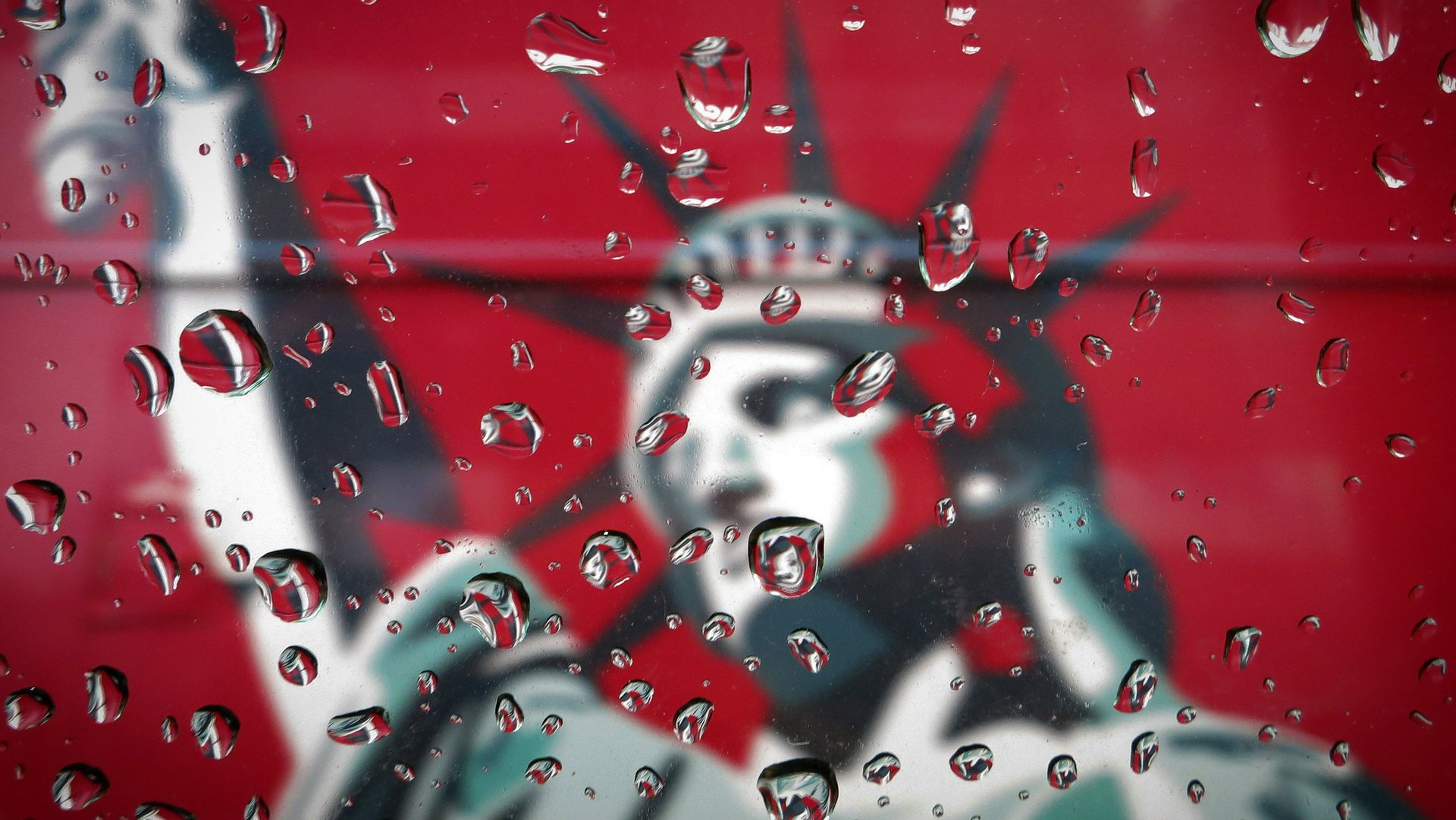I’m an immigrant who worked in tech, and Trump is breaking my American dream
A more personal, possibly naive, Monday Note, but these are highly unusual and dangerous times. We need to pay attention to the American dream—the real one reflected in the Statue of Liberty, not the false nostalgia of isolationists.


A more personal, possibly naive, Monday Note, but these are highly unusual and dangerous times. We need to pay attention to the American dream—the real one reflected in the Statue of Liberty, not the false nostalgia of isolationists.
For as long as I can remember, I looked at the United States as a beacon of hope.
Born in March 1944 in not-yet-liberated Paris (after being conceived in Berlin, a twisted story for another time), I saw several family members go west for artistic or Haight Ashbury pursuits.
In my youth I was obsessed with “radio”—the name, at the time, for “electronics.” My first love of Oct. 1955: the OC 71 germanium transistor:

For sins of truancy I was sent to a Breton boarding school where, in a stroke of luck, the prefect of discipline understood my obsession. He had a subscription to Le Haut-Parleur (The Loudspeaker) and let me read it after hours:

We looked at the US as a source of innovation, and as a land of opportunity, freedom, and big vistas, both physical and cultural.
Years later, in June 1968, another stroke of luck: Hewlett-Packard hired me for the dream job of launching its first desktop computer, the 9100A, on the French market. This was the good HP, the one accurately described in David Packard’s The HP Way. I prospered in a benevolent culture that reinforced my view of America as the right place for me. Contrary to the rigid French mores that severely curtailed opportunities for a college dropout, American companies seemed to care about what a person could actually contribute.
In Nov. 1970, my first trip to HP’s Loveland, Colorado division sealed the initiation. Having seen the Big Sky, the people, the labs, I knew I had to come and work there. Admittedly, I found some aspects of the culture puzzling—weak coffee with (not after) a steak lunch in a darkened restaurant called The Rear of The Steer—but I knew I had to come back.
That took another fifteen years.
By yet another stroke of luck, I was given the opportunity to run Apple’s engineering organization in Cupertino, California. My family moved there; our third child was born at Stanford’s hospital (the same birthday as Steve Jobs); I won a coveted Green Card in 1987; and, in 2001, we all became proud American citizens. In my case, I was part of a group of 996 inductees—only four of the 1,000 called didn’t join the ceremony. The federal judge presiding over the swearing-in noted that there were 80 nationalities in the room, from brooding Russian coders to frail Chinese grandmothers. “Register to vote, register to vote, it’s now your right and duty,” the good judge kept telling us.
As we streamed out of San Jose’s Civic auditorium, there were people at a table, ready to help us fill voter registration forms. They represented the Republican party. No Democrats—they must have been at the beach that sunny Summer day. So, I accidentally registered as a Republican.
Over time, reality tempered my picture of my adopted country. When I co-founded Be, Inc. with my friend Steve Sakoman, I had no idea what health insurance was. I came from a country where universal coverage was assumed, part of the landscape. Luckily, our business manager, Cory Van Arsdale, a repented attorney, got us a federally-backed program. As a result, when I tore my carotid artery and suffered a stroke, the whole emergency room, neurosurgery, and intensive care bill for five days came to $100 out of pocket. This was in 1993.
I began to see a different picture—one where people who called themselves Christians saw nothing wrong with letting their brethren try to get by without coverage, nothing wrong with insurance companies gaming their customers. I saw how we spend more for healthcare than any other nation and end up with worse outcomes than any first-world country, especially infant mortality and postpartum deaths. As my friend and former colleague Joe Palmer likes to say: It costs more, but it does less.
All this because of ideology, because our government spends about $1 trillion for a war in Iraq—a sum that would have been better spent on universal health coverage. European nations do it. It isn’t perfect, but their example, especially Germany’s, shows it’s possible and doesn’t bankrupt the country. But no, ideology wins. “It’s Socialism!”—a word used to shut down rational discussion. In that way, we’re just as bad as the religious extremists we claim to fight—an article of faith overrides facts.
At first too busy in Cupertino, and not yet a citizen, I later came to realize how we elected representatives who, once installed in Congress, sold us to a rogues’ gallery of lobbies for pharma, telecommunications, financial, oil, or agribusiness interests. Our solons need money for their next election campaign. All leading to the surreal Citizens United Supreme Court decision that give free speech and unlimited electoral spending to nonprofit corporations, including made-up ones for political campaigns.
Living in the Bay Area bubble, it took me a while to see the deep roots of racism in our country. These became more obvious, to me that is, when Barack Obama campaigned and got elected as our 44th president. Among other moments, I was struck by Hillary Clinton’s too-clever response when Obama was accused of being a Muslim: “I take him at his word (of being a Christian).” More courageous, she might have said “Stop this insanity!” But no, there was political advantage in letting doubt linger. And then, we had the shameful Sept. 2009 incident at Obama’s speech to a joint session of Congress when Southern “gentleman” Joe Wilson interrupted the president shouting “You lie.” For his reward, Wilson has repeatedly been reelected with comfortable margins.
We’re now a week into our new president’s inauguration. The campaign defied precedent and the result surprised and disappointed many. This was nothing compared to the week after the inauguration, one that defied expectations and precedent even more. From trade relations to healthcare, the environment, building a wall at the border with Mexico, draining the swamp with swamp dwellers, it’s a 360-degree grab and an angry set of lies, of “alternate facts.” A Holocaust remembrance without the word “Jew,” and a selective ban of people from certain “Muslim” countries.
When the media point out to the lies, incoherence, and pitfalls, a drunk-with-power chief White House strategist Steve Bannon tells the media they’re the opposition and should keep their mouths shut. He remembers, as I do, how for years the New York Times meekly refused to use the word “torture”—and later offered a mealy-mouth excuse for their failure to speak truth to power.
There is much more, but I must stop. This is what the country with the Statue of Liberty has become.
I still believe that, when it comes to themselves, pessimists are right, and optimists are also right. I’ve chosen my camp, I remain an optimist.
The Women’s Marches in the US show women (and men) engaged and getting an idea of the strength in their unexpectedly high numbers. Around the country, the sudden airport protests against the “Muslim ban” (shorthand for a complicated edict) are another ray of hope. Tyranny only works if people fear it. As we saw in the Eastern Bloc, once enough people rise up, praetorial guards lay down their weapons.
Here in the Valley, tech CEOs are taken to task for their timid protests against the latest bout of xenophobia—”It’s not a policy we support,” or “This is not the best way,” or “We’re concerned.”
I don’t think this is the right perspective. We’ve seen how a Trump tweet can hurt a company and its shareholders. A responsible CEO shouldn’t expose his constituents to irrational wrath. We’ve seen, during the transition, how Trump berated and threatened media executives in off-the-record exchanges. Imagine the scenario I saw on Twitter (but can’t find for proper attribution—update: it was @counternotions). Someone calls Brian Roberts, CEO of Comcast, and in a heavy mafia voice tells him “Nice little bidness you have here, be a shame if anything happened to it.” This because Comcast owns NBC and NBC runs Saturday Night Live and its sharp Trump parodies. They hurt their target’s needy ego—because they do what caricatures do, give relief to a truth.
Tech CEOs can still fight. They have plenty of money and many CEOs do have a moral compass. No need to expose their companies; just use a version of their media playbook—that is, hire proxies to point out the lies, dangers, and obfuscations. Today, many tech companies hire mouthpieces—“independent” consultants who act as quote machines, repeating talking points or lobbying grenades at their competition. Don’t think it’s a fantasy or a conspiratorial theory. I’ve seen it done from a ringside seat at a tech company that hired an “independent” quote machine to provide juicy tidbits to tech publications. Or when questioning the numbers of a “research” outfit, the executive replied she didn’t include companies that were not her clients. Or when on oft-quoted analyst dismissed Apple’s new 64-bit processor while “consulting” for a competitor.
Here, the stakes are different—one can’t be seen as connected to the individual or organization saying what the company can’t openly say. No money needs to flow from the company itself; friends, local or foreign, can oblige on a wink and a nod. Nothing illegal. The company can even play coy, say it would not condone such harsh criticism, accusations, or embarrassing revelations. Torpedoes would be launched, targeting Trump’s unstable mind and trying to provoke him to a disqualifying fault.
There’s also hope with the media who see the negative energy (and the traffic) and an opportunity to regain some lost respect. Several news organizations now offer ways to safely, anonymously provide opposing information.
This isn’t the country I once naively dreamed of. I know it’s likely to get uglier for a while, but strong reactions to last week’s events give me hope.